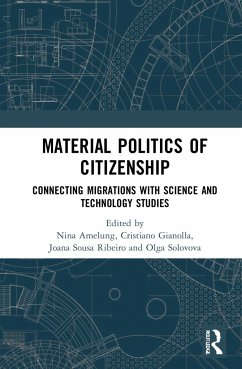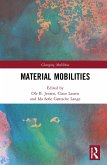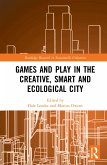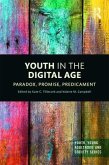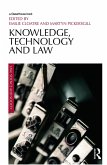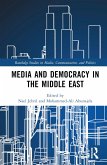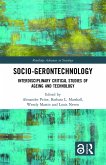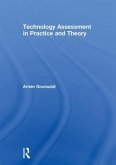Material Politics of Citizenship
Connecting Migrations with Science and Technology Studies
Herausgeber: Amelung, Nina; Ribeiro, Joana Sousa; Gianolla, Cristiano
Material Politics of Citizenship
Connecting Migrations with Science and Technology Studies
Herausgeber: Amelung, Nina; Ribeiro, Joana Sousa; Gianolla, Cristiano
- Gebundenes Buch
- Merkliste
- Auf die Merkliste
- Bewerten Bewerten
- Teilen
- Produkt teilen
- Produkterinnerung
- Produkterinnerung
From the intersection of citizenship, critical migration studies, and science and technology studies (STS), this book examines, across the various case studies, configurations between technologies, infrastructures and citizenship.
Andere Kunden interessierten sich auch für
![Material Mobilities Material Mobilities]() Material Mobilities189,99 €
Material Mobilities189,99 €![Games and Play in the Creative, Smart and Ecological City Games and Play in the Creative, Smart and Ecological City]() Games and Play in the Creative, Smart and Ecological City189,99 €
Games and Play in the Creative, Smart and Ecological City189,99 €![Youth in the Digital Age Youth in the Digital Age]() Youth in the Digital Age189,99 €
Youth in the Digital Age189,99 €![Knowledge, Technology and Law Knowledge, Technology and Law]() Knowledge, Technology and Law210,99 €
Knowledge, Technology and Law210,99 €![Media and Democracy in the Middle East Media and Democracy in the Middle East]() Media and Democracy in the Middle East189,99 €
Media and Democracy in the Middle East189,99 €![Socio-gerontechnology Socio-gerontechnology]() Socio-gerontechnology157,99 €
Socio-gerontechnology157,99 €![Technology Assessment in Practice and Theory Technology Assessment in Practice and Theory]() Armin GrunwaldTechnology Assessment in Practice and Theory189,99 €
Armin GrunwaldTechnology Assessment in Practice and Theory189,99 €-
-
-
From the intersection of citizenship, critical migration studies, and science and technology studies (STS), this book examines, across the various case studies, configurations between technologies, infrastructures and citizenship.
Produktdetails
- Produktdetails
- Verlag: Taylor & Francis Ltd (Sales)
- Seitenzahl: 166
- Erscheinungstermin: 18. November 2021
- Englisch
- Abmessung: 244mm x 170mm x 11mm
- Gewicht: 490g
- ISBN-13: 9781032062266
- ISBN-10: 1032062266
- Artikelnr.: 62267420
- Verlag: Taylor & Francis Ltd (Sales)
- Seitenzahl: 166
- Erscheinungstermin: 18. November 2021
- Englisch
- Abmessung: 244mm x 170mm x 11mm
- Gewicht: 490g
- ISBN-13: 9781032062266
- ISBN-10: 1032062266
- Artikelnr.: 62267420
Nina Amelung is Research Fellow at the Institute of Social Sciences, University of Lisbon. She works on public controversies, public involvement, and democratic challenges of cross-border biometric data-exchange in the context of crime and migration control infrastructures. She is especially interested in the reflection on emergent and marginalized publics. She has authored and co-authored peer reviewed articles and book chapters on the European asylum policies and biometric technologies applied in migration control infrastructures. Her latest co-authored book is entitled Modes of Bio-Bordering: The Hidden (Dis)integration of Europe. Cristiano Gianolla is a researcher at the Centre for Social Studies (CES) at the University of Coimbra (UC), where he is co-coordinator of the research unit on Democracy, Citizenship and Law, co-founding and co-coordinating member of the "Inter-Thematic group on Migrations", co-coordinator of the research group "Epistemologies of the South", and coordinating editor of Alice News. He is the Principal Investigator of the UNPOP project (FCT, 2021-2024) and co-coordinates the PhD courses "Democratic Theories and Institutions", "State, Democracy and Legal Pluralism", and the MA course "Critical Intercultural Dialogue" at the UC. His current research interests focus on emotions and narratives in democratic processes in a broader range of topics that include democratic theory, populism, postcolonialism, intercultural dialogue, heritage processes, movement-parties, citizenship, human rights, migrations, and cosmopolitanism. Joana Sousa Ribeiro is Researcher at the Centre for Social Studies (NHUMEP Research Group- Humanities, Migration and Peace Studies Research) at the University of Coimbra, Portugal, and a PhD student at the School of Economics, University of Coimbra. Her main research interests include socio-professional mobility of migrants and refugees, longitudinal studies, intercultural studies, and citizenship. She co-cordinates an IMISCOE research network group - YAMEC Network - that focuses on issues of mobility of young adults and the economic crisis and she is a founding member of the "Inter-Thematic group on Migrations" (ITM) at CES. Olga Solovova is Researcher at the Centre for the 20th Century Interdisciplinary Studies at the University of Coimbra, Portugal. In 2018-2020, she developed a Maria Sklodowska-Curie research action (MSCA-IF-2017:798157) at the Center for Mutlingualism in Society across the Lifespan (MultiLing), University of Oslo, Norway. Her project looked into discourses in action on the Norwegian-Russian border, and the role of Russia in the bordering practices within the multilingual economy. Her main fields of expertise are language ideologies and policies in multilingual and migrant contexts, social construction of space and multimodal meaning making, spaces and means of representation of the Other. She has authored and co-authored book chapters and articles on media representations of migrant and refugee population and language policies in migrant contexts and in academia.
1. Technologies, infrastructures and migrations: material citizenship
politics 2. After citizenship: autonomy of migration, organisational
ontology and mobile commons 3. Re-assembling the surveillable refugee body
in the era of data-craving 4. Fragmented citizenship: contemporary
infrastructures of mobility containment along two migratory routes 5.
Operation shelter as humanitarian infrastructure: material and normative
renderings of Venezuelan migration in Brazil 6. Knowledge and legitimacy in
asylum decision-making: the politics of country of origin information 7.
Driving social change from below: exploring the role of counter-security
technologies in constructing mobile noncitizens 8. Beyond citizenship: the
material politics of alternative infrastructures 9. A material politics of
citizenship: the potential of circulating materials from UK Immigration
Removal Centres
politics 2. After citizenship: autonomy of migration, organisational
ontology and mobile commons 3. Re-assembling the surveillable refugee body
in the era of data-craving 4. Fragmented citizenship: contemporary
infrastructures of mobility containment along two migratory routes 5.
Operation shelter as humanitarian infrastructure: material and normative
renderings of Venezuelan migration in Brazil 6. Knowledge and legitimacy in
asylum decision-making: the politics of country of origin information 7.
Driving social change from below: exploring the role of counter-security
technologies in constructing mobile noncitizens 8. Beyond citizenship: the
material politics of alternative infrastructures 9. A material politics of
citizenship: the potential of circulating materials from UK Immigration
Removal Centres
1. Technologies, infrastructures and migrations: material citizenship
politics 2. After citizenship: autonomy of migration, organisational
ontology and mobile commons 3. Re-assembling the surveillable refugee body
in the era of data-craving 4. Fragmented citizenship: contemporary
infrastructures of mobility containment along two migratory routes 5.
Operation shelter as humanitarian infrastructure: material and normative
renderings of Venezuelan migration in Brazil 6. Knowledge and legitimacy in
asylum decision-making: the politics of country of origin information 7.
Driving social change from below: exploring the role of counter-security
technologies in constructing mobile noncitizens 8. Beyond citizenship: the
material politics of alternative infrastructures 9. A material politics of
citizenship: the potential of circulating materials from UK Immigration
Removal Centres
politics 2. After citizenship: autonomy of migration, organisational
ontology and mobile commons 3. Re-assembling the surveillable refugee body
in the era of data-craving 4. Fragmented citizenship: contemporary
infrastructures of mobility containment along two migratory routes 5.
Operation shelter as humanitarian infrastructure: material and normative
renderings of Venezuelan migration in Brazil 6. Knowledge and legitimacy in
asylum decision-making: the politics of country of origin information 7.
Driving social change from below: exploring the role of counter-security
technologies in constructing mobile noncitizens 8. Beyond citizenship: the
material politics of alternative infrastructures 9. A material politics of
citizenship: the potential of circulating materials from UK Immigration
Removal Centres

